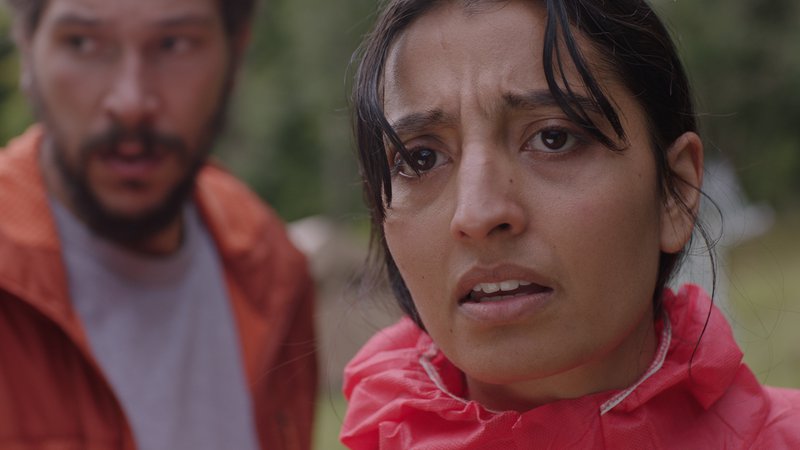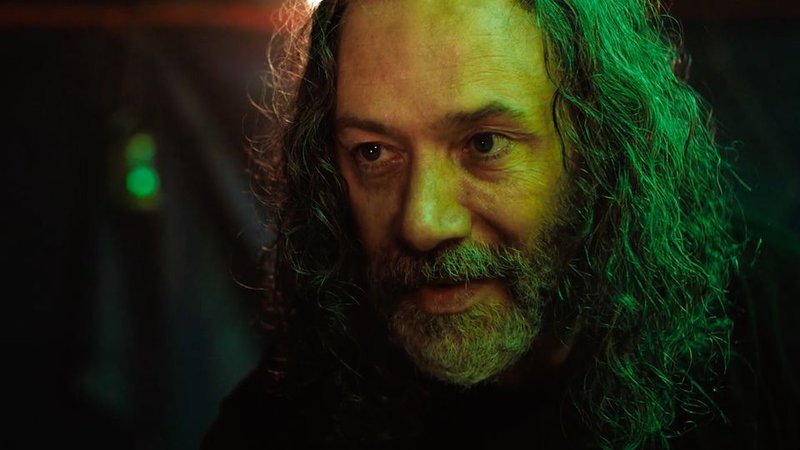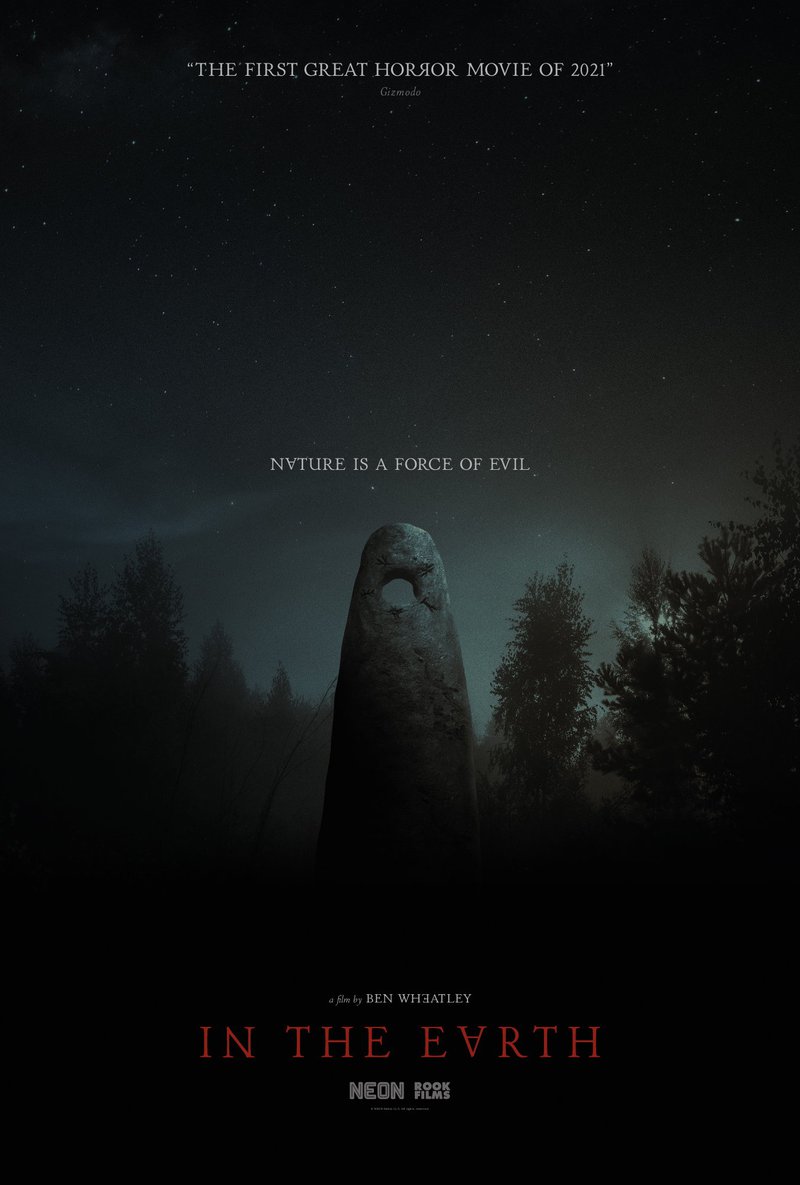Ben Wheatley’s new film In The Earth is a folk horror movie about something ancient and unknowable in the forest. It’s also a science fiction film with the DNA of Nigel Kneale’s Quatermass series running through its vines. It’s also, for a while at least, an honest-to-gods slasher film, and a damn effective one. On top of all that, it’s also a pandemic movie, or at least a pandemic-aware movie, set in a world of social distancing, sanitizing stations and rapid tests that will all make In The Earth either incredibly dated in two years, or perhaps the only 2021 release that won’t feel dated by then.
Set against the backdrop of an unnamed “disastrous virus,” In The Earth follows a scientist (Joel Fry) and a park scout (Ellora Torchia) on a two-day journey by foot deep into the woods where a research scientist (Hayley Squires) has gone radio silent. Her discovery, and the group’s encounter with a resourceful hermit (Reece Shearsmith) living in the woods, set the stage for a visceral but heady experience that Wheatley has said he wanted to be “immediate” (he and his crew shot the film in 15 days in the middle of 2020), but one that is also in conversation with not only the director’s previous work, but genre cinema as a whole.
FANGORIA talked with Wheatley about his exceptional new film, which opens Friday.
I read an interview you did ten years ago where you said that the woods frightened you as a child. I was curious if you're still sorting that out, because you keep going back! You go away, you go into other spaces, like High Rise or Rebecca, but it feels like the woods keep calling you back.
I think it's something primal. Part of the ideas behind these movies are about that kind of schism of being a modern person, but somehow feeling that modernity itself is a bit of a dream; it’s not really real. Modernity does that thing of covering up, certainly in the Western cultures, of the realities of childbirth and the realities of death, and it kind of just goes, 'Don't worry about any of that. That's all fine. People who get sick have failed; you won't get sick. You'll never die.' And then you do die and everyone avoids the reality of it.
I think about my internal peasant self from the dark ages quite a lot and what that person would have been like, and probably how not much different from me they were. That woodland thing is part of that. The woods don't care about you and your iPhone and your problems, and if you twist your ankle out in the woods, you might die. It's as simple as that.
Is your 'internal peasant self' the character type that you seem to return to in your work? These folks who end up becoming apostles of something older, of something forgotten, of something primal – are those your avatars in your work?
Well, I'll tell you that I'm Martin [Fry] in this film, because I'm particularly useless and cowardly.
He’s very relatable.
I had great fun writing him and I wanted to make sure that he was as terrible as possible in that respect. But I was also looking at it from the perspective of genre, because I'm aware of the ‘50s scientific character who would also be punching people and taking command, and with his counterpart, who'd be the military character and then his girlfriend who'd have a big dress. That specific dynamic is obviously kind of gone with time, but I was thinking of this Hawksian thing of characters who can do stuff and do jobs and they do jobs well, which is from (the Howard Hawks-produced) The Thing From Another World, which had great phalanxes of scientific characters who could all do great stuff. I wanted to make sure that each of the sets of characters in this film did their own job well, but couldn't do each other's jobs.
So it was about avoiding how, within genre, you get this thing of people beginning to pick up shotguns and knowing how to use them properly, or they suddenly become leaders when they don't deserve to be a leader. I think that was really important; you’ve got the Alma [Torchia] character, who is a person who works in the wild and knows how to survive in the wild. That's her job, so of course she knows how to do it and keep her head. Martin works in a lab, he's useless outside and he doesn't suddenly develop skills. He will always be useless outside. But when he has to do his science stuff, he's all right at it. It was that kind of moving within genre archetype which was part of the fun of it.

Is that something you think much about in your work? Where they take place in the continuum of the genre, or how they might comment on or add to an existing canon?
Yeah, it's a conversation with those films, because I love them and I think that's all part of the DNA of becoming a filmmaker. You got hooked on the films in the first place, and it's trying to go back to why you like them to understand them. A lot of these things are a working through of that, so with In The Earth there's stuff I knew I was doing and then there was stuff I was surprised I was doing. So you've got a madman in the woods and body horror, but you've also got ‘70s British science fiction, Quatermass and Doctor Who, and then psychedelia as well.
One of the other things that made me go down the road of this movie was I found a shooting schedule for John Carpenter’s Halloween online, and I was looking at it and going, 'Well, look at this, it's only a three-week shoot,' and their budget is [adjusted for inflation] the same as what we had. So they had a few more days to shoot, but we had the same amount of money. I was thinking there's something so pure about that. It's great to work within that kind of bracket of genre and of budget because as things get bigger and bigger, it takes away from the ingenuity that those filmmakers needed to have and the cleanness of thought that they needed to have to make those films originally. It’s going back to having the same tools as the masters had and going, 'Right, you're not going to have everything. You've just got this. They did it with that. So why can't you do with that?'
Well, one answer would be that John Carpenter didn’t make Halloween during a global pandemic; you decided to go ahead and make a feature film in the middle of one. The film has a specific awareness of the pandemic, but it's not really explicitly about a pandemic. But you dove in last August, when no one had any idea how it was going to shake out. Was it important for you to capture something immediate?
It was important to make something that was contemporary and that's the thing. We're in a weird moment where there's talk of 'pandemic films,' but really they're just films of now. In a way, we should be talking about 'old films,' which are all films before the pandemic, and then 'the new films.' And then, some of the 'old films' [from 2019] are still being released now, but they're kind of weirdly irrelevant because they haven't been through this big event. I guess it's kind of like what happened in France after the war when film noir happened, when all those thrillers from the late ‘30s, early ‘40s got released in a big glut of movies.
The commentary on the pandemic is minor because it's just a film that happens now. It's happening now, and I find it weird that the movies wouldn't acknowledge what's happened. There's a lot of talk about zeitgeist in general, but the beginning of the pandemic felt to me like the first time the zeitgeist was almost immediate. It's right at your door. I talked to people all over the world and everyone was having the same experience. It was the first time that had ever happened as far as I can see and even world-shaking events usually go in a wave, or aren't as important to some people as they are to others. But with this, it was everybody was affected at once and I thought, 'That is new.'
The film touches so many different bases in horror, but perhaps most surprising is the way it becomes a legitimate 'slasher in the woods' movie for a little while. Were are you scratching any particular itches there? Were those films that you sort of enjoyed growing up?
Yeah. I mean, slasher films are fundamental. In the film, 'ATU 327A' is the number of where the base is located; that’s the folkloric reference to Hansel and Gretel. So it goes from that kind of German, folkloric tradition all the way through Texas Chain Saw Massacre, which could also be a folkloric tale in a way. It's not dissimilar.

Any particular favorites from that era that you were thinking of when you tackled that part of the film?
I'm a massive fan of Evil Dead and Evil Dead 2. Evil Dead 2 specifically completely changed the way I felt about cinema. I went, I saw it on my own accidentally. I didn't know what it was. I saw it in the cinema as a child. And I went in one person came out someone else.
It changed me. And halfway through making this one, I was going, 'Oh god, I'm so enjoying doing the prosthetic side of it. Why don't I carve more bodies in movies?' But that's partially to do with the amazing effects work from Dan Martin, who I've been working with for the last three or four movies. He's done some of the most impressive prosthetic effects I've seen.
What’s your collaboration like with him?
Thinking again of working within those brackets, I at first was trying to find out what he had in his studio. I was going to work backwards from the gags that he had lying around or the things that were so extreme that other people wouldn't touch, because he's always making this stuff that's really, really horrible, and that never gets on the screen, and just kind of work backwards from that. But yeah, Dan [was] absolutely dedicated to the cause. When you work with someone like him, you keep hold of them with both hands.
Reece Shearsmith is an actor you return to often. What does he bring to your work that you can't get anywhere else?
Lots of stuff. I like working with actors who also understand comedy thoroughly because a lot of horror is comedy; it's about timing and gags and setups and payoffs and so comedic actors understand all that. He also has an incredibly deep understanding of horror and how that works and the timings of things, specifically for horror. His work on Inside No. 9 is incredible. And I know that the depth of his knowledge is much deeper than mine as well.

There’s a theory that behind every apocalyptic mindset is an egocentric urge to be here for the end. The theory is we all want to be at the wheel when it all goes down. Do you think that preoccupation informs a lot of your work?
I think that what got me particularly worried was the 2008 crash. And then I started to understand what zombie films were, which are basically civil war movies, but it's more acceptable to kill your neighbors when they're dead.
Once I started reading about the fact that all the banking systems almost crashed overnight, I thought, "What would I have done? I've got no money. I don't have any gold." And then we started making plans about what we would do and how we would survive, and stockpiling. We've all kind of been in that state ever since really, thinking about life in that way.
And I don’t mind that, honestly. That’s a pretty good thing, I think. I think the other argument is that modern society has totally infantilized us all in that we’re kind of just completely useless. I'm finding just dealing with modern addictions, like phones and getting off the internet and stuff – that's a full-time job in itself. I'm sure it's going to [be] that we'll be looking back on this period and no one will be coming out of it well, unfortunately.
In The Earth opens in theaters and VOD on Friday.







